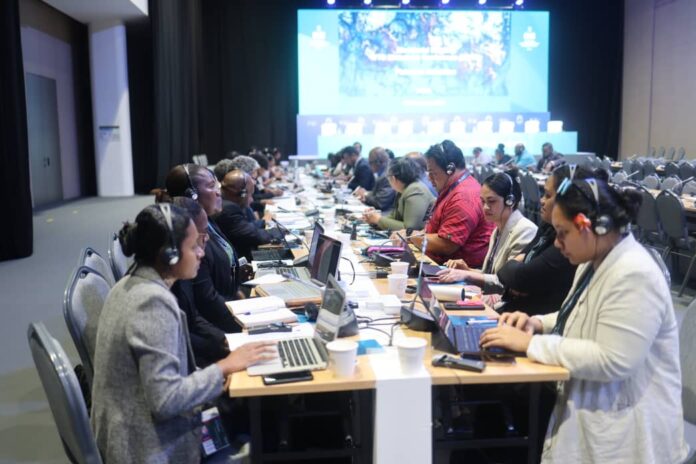Abu Dhabi, February 25, 2024- The Minister for International Trade and Investment, Hon. Richard Maru indicated to his counterparts from Pacific ACP who had gathered in Abud Dhabi, United Arab Emirates for the World Trade Organization (WTO) 13th Ministerial Conference (MC13) that Papua New Guinea will maintain its position to standstill on fisheries subsidies.
Minister Maru in the Pacific ACP WTO Trade Ministers Briefing yesterday evening (local time) said: “We own the resources, but we keep being used because we have no capacity and we have never really had a vision to rise up. We have been used and larger fishing nations think that they can continue to come and walk over us. The time has come for us to rise up and we need to start giving them a signal that the days of using our resources and using us just for our resources has to be a thing of the past. For PNG we are in transition. We will for the first time in our history introduce an export tax to all fishing companies that bring out unprocessed fish from our waters starting in July this year. We are also now negotiating to buy into a major fishing company in PNG with the view to owning our own vessels and fishing our own waters. We are very determined to domesticate our fishing industry, and we are hoping that the negotiations will conclude in the next two to three months and for the first we will start to own a company and build our own processing facilities in a very big way. We are going to declare the proposed Pacific Marine Industrial Zone (PMIZ) in Madang a free trade zone. We will give tax incentives to every company who wants to build their own processing facilities in the PMIZ including those from the Pacific Region. We already have a wharf, and we are working on servicing all the vessels and we are going to start work in a very serious way starting this year. We cannot continue to be rent collectors; that has to be a policy of the past. We have had enough; the time for change has come and PNG is prepared to lead that change.”
The Sustainable Development Goals (SDG 14.6) stipulated that certain fishing subsidies cause environmental and economic harm and must be prohibited. The Agreement of Fisheries Subsidies (AFS) concluded at MC12 in June last year at Geneva aimed to address two pillars of the three pillared problem- subsidies to illegal, unregulated, and unreported (IUU) fishing and subsidies to fishing on overfished stocks. It did not cover subsidies that contribute to overcapacity and overfishing (OCOF) which has always been the most commercially important third pillar of the longstanding negotiations. At MC12, Ministers decided to continue negotiating on that topic with a view to adopting “comprehensive disciplines” within four years of the AFS entering into force. If members do not do so, the AFS may be terminated. This creates an incentive to come to an agreement on OCOF within a certain timeframe. So far 61 members have accepted the AFS. 110 must accept it (two-thirds of the 164 total in the WTO) for it to enter into force.
“The current high level of subsidies by a handful of distant water fishing nations causes environmental problems and creates unfair competition, making it difficult for the Pacific to build its own fleet. A strong OCOF agreement at MC13 to complement this is in the interests of Pacific Island members,” said Minister Maru.
Minister Maru also met with the Fijian Deputy Prime Minister & Minister for Trade, Cooperatives, Small and Medium Enterprises, and Communications, Hon. Manoa Seru Narakasabaria Kamikamica after the briefing and agreed to meet in Suva in the last week of month for bilateral talks.
“The agendas of the discussions will include ratification of the Melanesian Spearhead Group (MSG) Trade Agreement, dual listing of the PNG stocks in the Fiji Stock Exchange and vice versa, investment opportunities for Fiji investors in Special Economic Zones in PNG especially manufacturing companies, investment opportunities for PNG companies in Fiji, training of Papua New Guineans in Fiji in the area of tourism, and non-tariff barriers of PNG export goods to Fiji,” said Minister Maru.


